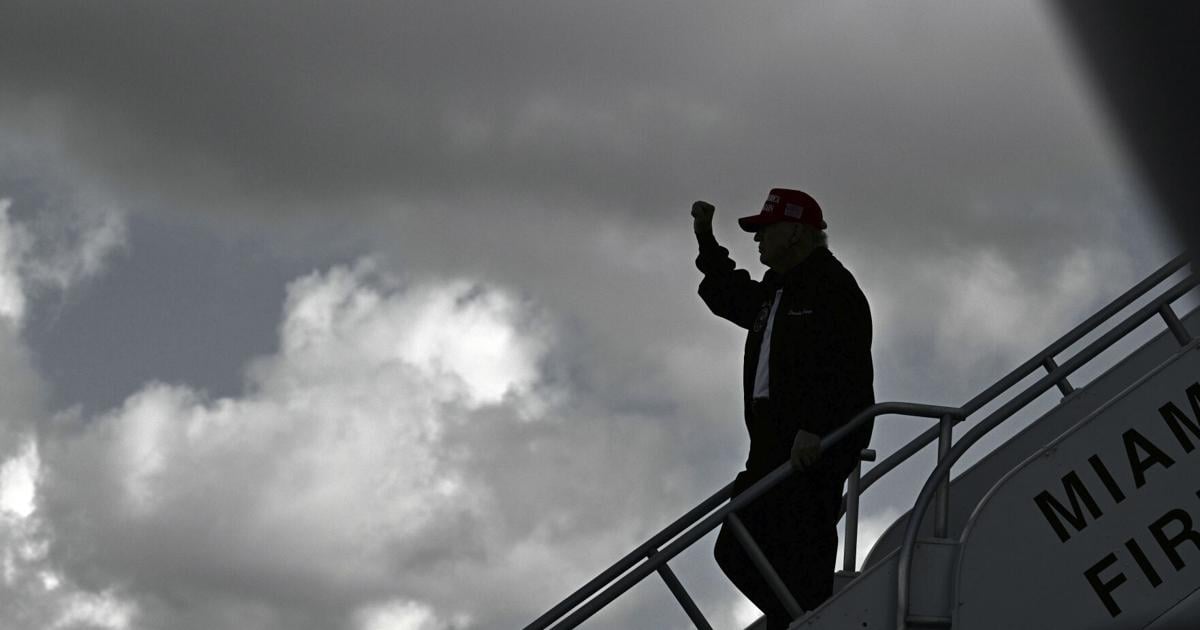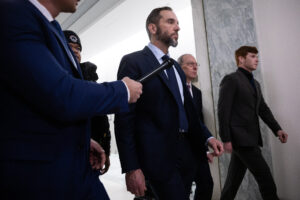The Dictatorship
Trump warns Zelenskyy to quickly negotiate war’s end with Russia or risk not having a nation to lead

MIAMI (AP) — President Donald Trump on Wednesday warned Ukrainian President Volodymyr Zelenskyy that he “better move fast” to negotiate an end to Russia’s invasion of Ukraine or risk not having a nation to lead.
The rhetoric from Trump toward Ukraine comes amid an escalating back-and-forth between the two presidents and rising tensions between Washington and much of Europe over Trump’s approach to settling the biggest conflict on the continent since World War II.
Trump’s harsh words for Zelenskyy drew criticism from Democrats and even some Republicans in the United States, where Ukraine’s defense against Russian aggression has had bipartisan support. Zelenskyy said Trump was falling into a Russian disinformation trap — and was quickly admonished by Vice President JD Vance about the perils of publicly criticizing the new president.
Trump, who is trying to bring the fighting to a close on terms that Kyiv says are too favorable to Moscow, used an extended social media post on his Truth Social platform to lash out at Zelenskyy and call the Ukrainian a “dictator without elections.”
“Think of it, a modestly successful comedian, Volodymyr Zelenskyy, talked the United States of America into spending $350 Billion Dollars, to go into a War that couldn’t be won, that never had to start, but a War that he, without the U.S. and ‘TRUMP,’ will never be able to settle,” Trump said of Zelenskyy, who was a popular television star in Ukraine before running for office.
AP AUDIO: Trump warns Zelenskyy to quickly negotiate war’s end with Russia or risk not having a nation to lead
AP Washington correspondent Sagar Meghani reports President Trump and Ukraine’s Volodymyr Zelenskyy are trading barbs as relations sour over the Russia war.
The U.S. has obligated about $183 billion since Russia invaded Ukraine in February 2022, according to the U.S. special inspector general, conducting oversight of American assistance to Ukraine.
Trump accused Zelenskyy of being “A Dictator without Elections!!” Due to the war, Ukraine did delay elections that were scheduled for April 2024.
He later repeated many of the criticisms of Zelenskyy, who he said has done a “terrible job,” during an address before a meeting in Miami of business executives hosted by Saudi Arabia’s sovereign wealth fund.
Trump also contended that Zelenskyy was misusing American aid intended for the war effort and had taken advantage of Democrat Joe Biden’s administration.
The Republican president was riled by Zelenskyy’s charge that Trump “lives in this disinformation space” fostered by Moscow. “We have seen this disinformation. We understand that it is coming from Russia,” Zelenskyy said.
Vance told the Daily Mail that Zelenskyy’s criticism of Trump was not helping his cause. “The idea that Zelenskyy is going to change the president’s mind by bad mouthing him in public media, everyone who knows the president will tell you that is an atrocious way to deal with this administration,” Vance said.
Ukrainian officials, however, continue to raise their concerns about Trump’s approach.
“Why should dominance be handed over to a country that is an aggressor, a violator of international law, and the author of aggression against Ukraine?” said Mykhailo Podolyak, an adviser to Zelenskyy. “We still do not understand this strategy.”
U.S. and Russian officials meeting in Saudi Arabia on Tuesday agreed to negotiate a settlement to an end to the war. Ukrainian and European officials were not included.
Trump said Zelenskyy should have worked out a deal earlier. “Zelenskyy better move fast or he is not going to have a Country left,” Trump said.
“In the meantime, we are successfully negotiating an end to the War with Russia, something all admit only ‘TRUMP,’ and the Trump Administration, can do. Biden never tried, Europe has failed to bring Peace, and Zelenskyy probably wants to keep the ‘gravy train’ going,” Trump wrote.
The rhetoric from Trump went even further than the false charges he made Tuesday against the Ukrainians when he suggested Kyiv was responsible for starting the war. Russia invaded its smaller neighbor.
Senate Democratic leader Chuck Schumer of New York was appalled that Trump was blaming Ukraine for Russian President Vladimir Putin’s invasion.
“It’s disgusting to see an American president turn against one of our friends and openly side with a thug like Vladimir Putin,” Schumer said.
Sen. John Kennedy, R-La., said he disagreed with Trump’s suggestion that Ukraine was responsible.
“I think Vladimir Putin started the war,” Kennedy said. “I also believe, from bitter experience, that Vladimir Putin is a gangster. He’s a gangster with a black heart” who has Soviet dictator Josef Stalin’s “taste for blood.”
Sen. Dick Durbin, D-Ill., said Trump’s words were insulting to the thousands of Ukrainians who have died in the war and he accused the president of parroting Putin. “I would call on President Trump to apologize to the people of Ukraine, but it would be a waste of breath,” Durbin said. “Donald Trump is a pushover for Putin.”
Senate Majority Leader John Thune of South Dakota is among the Republican lawmakers who have supported Ukraine over the course of the war. He said the Trump administration needed space as it seeks a resolution. “The president speaks for himself,” Thune said about Trump’s sharpening rhetoric toward Zelenskyy. “What I want to see is a peaceful result, a peaceful outcome.”
The administration has also shown frustration with Zelenskyy for directing his ministers last week not to sign off on a proposed agreement to give the United States access to Ukraine’s rare earth minerals. The Ukrainians said the document was too focused on U.S. interests.
The proposal, a key part of Zelenskyy’s talks with Vance on the sidelines of the Munich Security Conference, did not offer any specific security guarantees in return. Trump during his speech in Miami fumed about the Ukrainians walking away from an agreement. “They broke that deal,” Trump charged.
Trump, speaking with reporters aboard Air Force One after his speech Wednesday evening, said the U.S. believed it had a deal on accessing Ukraine’s critical minerals when Treasury Secretary Scott Bessent travelled to Kyiv last week.
Trump added the Ukrainians “agreed to it more or less and then Scott Bessent went there and was treated rather rudely because essentially they told him no.”
Ukrainian officials met Wednesday in Kyiv with retired U.S. Lt. Gen. Keith Kellogg, Trump’s special envoy to Ukraine and Russia.
“It’s an egregious war in the sense of the length of time and casualties there and he understands the human suffering,” Kellogg said of Trump’s thinking. “He understands the damage that we can see and we want to see an end to it.”
___
Madhani and Pesoli reported from Washington. AP Congressional Correspondent Lisa Mascaro in Washington and Associated Press writers Susie Blann and Hanna Arhirova in Kyiv, Ukraine, contributed to this report.
The Dictatorship
Man arrested for assaulting congressman at Sundance Film Festival

PARK CITY, Utah (AP) — A man was arrested Friday night at a party during the Sundance Film Festival in Park City, Utah, for allegedly assaulting a Florida congressman.
Democratic U.S. Rep. Maxwell Frost wrote on X on Saturday that he was punched in the face by a man who told Frost that President Donald Trump was going to deport him. The altercation occurred at a private party hosted by talent agency CAA at the High West Distillery, a popular venue for festival-adjacent events.
“He was heard screaming racist remarks as he drunkenly ran off,” Frost wrote. “The individual was arrested and I am okay.”
Frost, the first Gen Z member of Congress, thanked the venue security and the Park City Police Department for their help. A Park City Police Department representative said officers arrived on the scene just after midnight.
Christian Joel Young, 28, was arrested on charges of aggravated burglary, assaulting an elected official and assault and transported to Summit County Jail, according to court records.
Young appeared to have crashed the party by jumping a fence and had a Sundance Film Festival pass that was not issued in his name, according to the police affidavit.
It was unclear if Young had an attorney who could speak on his behalf. The Associated Press left messages with the Summit County Sheriff’s office and Utah courts in an attempt to request comment from Young or a lawyer.
Stay up to date with the news and the best of AP by following our WhatsApp channel.
The Sundance Film Festival representatives released a statement saying that they “strongly condemn” the incident, noting that while it occurred at a non-affiliated event that the behavior is “against our values of upholding a welcoming and inspiring environment for all our attendees.”
“The safety and security of our festival attendees is always our chief concern, and our thoughts are with Congressman Frost and his continued well-being,” the statement read. “We encourage anyone with additional information on this matter to contact the Park City Police Department.”
County Judge Richard Mrazik ordered Young held without bail, on the grounds that he would constitute, “a substantial danger to any other individual or to the community, or is likely to flee the jurisdiction of the court if released on bail.” Young has a prior misdemeanor conviction, according to court records.
Utah Gov. Spencer Cox, a Republican, denounced the alleged attack and said he won’t let tensions over immigration enforcement in places like Minneapolis spill into Utah.
“Political or racially charged violence of any kind is unacceptable in Utah,” Cox said in a statement. “I’m grateful to local law enforcement for swiftly apprehending the assailant and pursuing justice for Rep. Maxwell Frost.”
Federal immigration enforcement efforts are “welcome and necessary,” he added.
House Minority Leader Hakeem Jeffries wrote on X that he was horrified by what had happened and that “the perpetrator must be aggressively prosecuted.”
“Hate and political violence has no place in our country,” Jeffries continued.
Messages seeking comment were left for representatives for CAA.
___
Associated Press writer Hannah Schoenbaum contributed.
___
For more coverage of the 2026 Sundance Film Festival, visit: https://apnews.com/hub/sundance-film-festival
The Dictatorship
Amanda Gorman honors Alex Pretti in new poem

Amanda Gorman shared a powerful poem on Instagram that she wrote in honor of Alex Pretti, the 37-year-old ICU nurse and U.S. citizen killed by a federal immigration officers in Minneapolis, Minnesota, on Saturday.
The poem, “For Alex Jeffrey Pretti,” characterizes Pretti’s killing as a “betrayal” and an “execution.”
Gorman, earlier this month, also paid tribute to Renee Nicole Good, another U.S. citizen killed by a federal immigration officer in Minneapolis on Jan. 7. In a caption accompanying another poem shared on Instagram, Gorman said she was “horrified by the ongoing violence that ICE wages upon our community. Across our country, we are witnessing discrimination and brutality on an unconscionable scale.”
Her poem says, in part: “You could believe departed to be the dawn/ When the blank night has so long stood./ But our bright-fled angels will never be fully gone,/ When they forever are so fiercely Good.”
The 27-year-old writer and activist famously recited her poem, “Blue Light News We Climb,” at Joe Biden’s presidential inauguration in 2021. Gorman has also written poems in the wake of other tragedies in the country, including “Hymn for the Hurting,” about the Robb Elementary mass shooting in Uvalde, Texas in 2022. She also performed a poem she wrote about reproductive rights and the Roe V. Wade Supreme Court case in a NowThis video in 2019.
Erum Salam is a breaking news reporter and producer for MS NOW. She previously was a breaking news reporter for The Guardian.
The Dictatorship
Ted Cruz bashes Vance and Trump in secret recordings
Sen. Ted Cruz, R-Texas, in recordings obtained by Axiosseems to have a bone to pick with Vice President JD Vance and sometimes, President Donald Trump.
In his remarks, which lasted about 10 minutes and were reportedly made in a private meeting with donors sometime last year, Cruz portrays himself as an economically-minded, pro-interventionist who has the president’s ear.
The Texas senator is also heard criticizing former Fox News personality, Tucker Carlson, and his relationship with the vice president. “Tucker created JD. JD is Tucker’s protégé, and they are one and the same,” Cruz told donors.
Cruz, who has clashed with Carlson in the past over foreign intervention policies, bashed the administration’s appointment of Israel critic Daniel Davis to a top national intelligence position. A vocal supporter of Israel himself, Cruz called Davis “a guy who viciously hates Israel,” and credited himself with removing Davis from the job.
The Republican senator also blamed Vance and Carlson for ousting former national security adviser Mike Waltz over similar anti-interventionist sentiments related to Iran.
“[Waltz] supported being vigorous against Iran and bombing Iran — and Tucker and JD took Mike out,” Cruz said.

Cruz also said he has been trying to get the White House to accept a trade agreement with India, but claimed White House economic adviser Peter Navarro, Vance and “sometimes” Trump, are resistant.
Domestically, Cruz cautioned donors about Trump’s tariffs, which he said could result in severe economic and political consequences. Cruz is reportedly heard telling donors that he told the president “if we get to November of [2026] and people’s 401(k)s are down 30% and prices are up 10–20% at the supermarket, we’re going to go into Election Day, face a bloodbath.”
Cruz said a conversation he had with Trump about tariffs “did not go well,” and that Trump was “yelling” and “cursing.” Cruz said Trump told him: “F*** you, Ted.”
“Trump was in a bad mood,” Cruz said. “I’ve been in conversations where he was very happy. This was not one of them.”
In a statement about the recordings, a spokesperson for Cruz said he is “the president’s greatest ally in the Senate and battles every day in the trenches to advance his agenda. Those battles include fights over staffers who try to enter the administration despite disagreeing with the president and seeking to undermine his foreign policy” and that “these attempts at sowing division are pathetic and getting boring.”
In an email responding to MS NOW’s request for comment on Cruz’s reported statements, the White House did not address Cruz’s statements.
Erum Salam is a breaking news reporter and producer for MS NOW. She previously was a breaking news reporter for The Guardian.
-

 The Dictatorship11 months ago
The Dictatorship11 months agoLuigi Mangione acknowledges public support in first official statement since arrest
-

 Politics11 months ago
Politics11 months agoFormer ‘Squad’ members launching ‘Bowman and Bush’ YouTube show
-

 The Dictatorship5 months ago
The Dictatorship5 months agoMike Johnson sums up the GOP’s arrogant position on military occupation with two words
-

 Politics11 months ago
Politics11 months agoBlue Light News’s Editorial Director Ryan Hutchins speaks at Blue Light News’s 2025 Governors Summit
-

 The Dictatorship11 months ago
The Dictatorship11 months agoPete Hegseth’s tenure at the Pentagon goes from bad to worse
-

 Politics11 months ago
Politics11 months agoFormer Kentucky AG Daniel Cameron launches Senate bid
-
Uncategorized1 year ago
Bob Good to step down as Freedom Caucus chair this week
-

 Politics9 months ago
Politics9 months agoDemocrat challenging Joni Ernst: I want to ‘tear down’ party, ‘build it back up’





